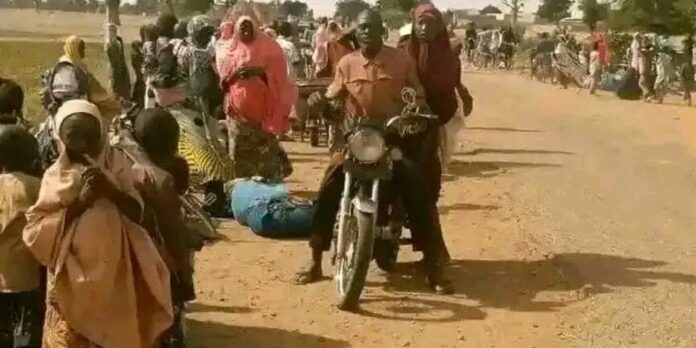The escalating violence in Southern Katsina, driven by an increase in killings and kidnappings by bandits, has forced residents of several villages in the Bakori Local Government Area (LGA) to abandon their homes and seek refuge elsewhere. The violence has been particularly severe in the villages of Guga, Kakumi, and Kandarawa, with the ongoing attacks making it increasingly unsafe for the locals.
The surge in criminal activity has raised alarm despite efforts by the Katsina State government to improve security. The state had launched the C-Watch initiative in a bid to combat crime and restore safety in the region. However, reports indicate that the initiative has not been sufficient in curbing the rising violence.
In a recent post on social media, a source identified as @DanKatsina50 shared a picture of residents fleeing their villages in fear. Along with the image, the source lamented that the situation in Southern Katsina has worsened, especially during the ongoing Ramadan period. The post read, “Residents of Guga, Kakumi & Kandarawa of Bakori LGA, are fleeing as bandits intensify killings & kidnappings this Ramadan. Despite the C-Watch launch by the State gov’t, attacks also persist in Kankara, Malumfashi & Faskari LGAs.”
The attacks have reportedly been more frequent in these areas, with bandits targeting vulnerable individuals for kidnapping and committing brutal killings. The ongoing violence has left many residents feeling trapped, with little to no protection from security forces.
The situation in the Bakori LGA is not isolated, as neighboring areas such as Kankara, Malumfashi, and Faskari have also been severely impacted by the same bandit groups. These persistent attacks have led to widespread fear and uncertainty among the people, as they face the daily threat of abduction or death.
As the residents flee in large numbers, questions are being raised about the effectiveness of the state government’s security measures. While the C-Watch initiative was launched with the aim of bolstering security, there are concerns that it has not been adequately implemented or supported to achieve its objectives.
The Katsina State government, under the leadership of Governor Aminu Bello Masari, has set up a commission of inquiry to investigate the causes of the persistent bandit attacks in Bakori and Kankara LGAs. The commission, which is headed by Justice Abbas Abdullah Bawale, has begun holding public hearings to gather information on the scale of the violence and the factors contributing to the worsening insecurity in the region.
The commission’s investigations are critical in understanding the root causes of the banditry and in finding effective solutions to the security crisis. However, residents are growing increasingly impatient with the pace of the response and are calling for more immediate and decisive action to restore peace and stability to the region.
In the meantime, the people of Southern Katsina are struggling to cope with the ongoing turmoil. Villagers in Bakori and surrounding areas are in urgent need of protection and support. Many families have lost loved ones to the violence, while others are forced to live in constant fear of further attacks.
Despite the dire situation, many locals have expressed a desire to remain in their communities, but their ability to do so is severely limited by the fear of being caught up in the violence. As a result, many are left with no choice but to flee in search of safer areas.
The ongoing violence in Katsina is also having a significant impact on the wider northern Nigeria region. As banditry and insecurity continue to spread, neighboring states are beginning to feel the effects. The security situation in Katsina is now a matter of national concern, and the federal government will need to coordinate with state authorities to tackle the growing menace of banditry in the region.
While many residents of Southern Katsina have voiced their frustration with the government’s response, they are also calling for greater collaboration between security forces, local leaders, and communities to address the issue. There is a growing recognition that without collective action, the problem of banditry will only continue to escalate.
In light of the current crisis, the Katsina State government faces mounting pressure to not only enhance security but to also rebuild the trust of the people. Restoring safety to the affected communities will require a multi-pronged approach, including stronger law enforcement, community engagement, and a renewed focus on tackling the root causes of insecurity.
Furthermore, the increasing violence during Ramadan has raised concerns about the potential for further religious or ethnic tensions. Southern Katsina, which is home to a predominantly Muslim population, is now grappling with insecurity that threatens to disrupt the peaceful coexistence among various religious and ethnic groups. Efforts to improve religious harmony and promote unity will be crucial in maintaining stability as the region works to recover from the effects of banditry.
As the situation continues to unfold, many are hopeful that the commission of inquiry will lead to meaningful changes that will help restore peace to the affected areas. The residents of Guga, Kakumi, Kandarawa, and surrounding villages are looking for concrete solutions that will allow them to return home and live without fear of violence.
The Nigerian government, both at the state and federal levels, must act quickly and decisively to address the security crisis in Katsina and other northern states facing similar challenges. The growing threat of banditry is not only a regional issue but a national one that demands urgent attention and action.
For now, the people of Southern Katsina remain in fear, with many hoping for a swift resolution to the insecurity that has displaced them from their homes and shattered their sense of safety. The success of the Katsina State government’s response will have far-reaching implications for the future of the region and the fight against banditry in northern Nigeria.

